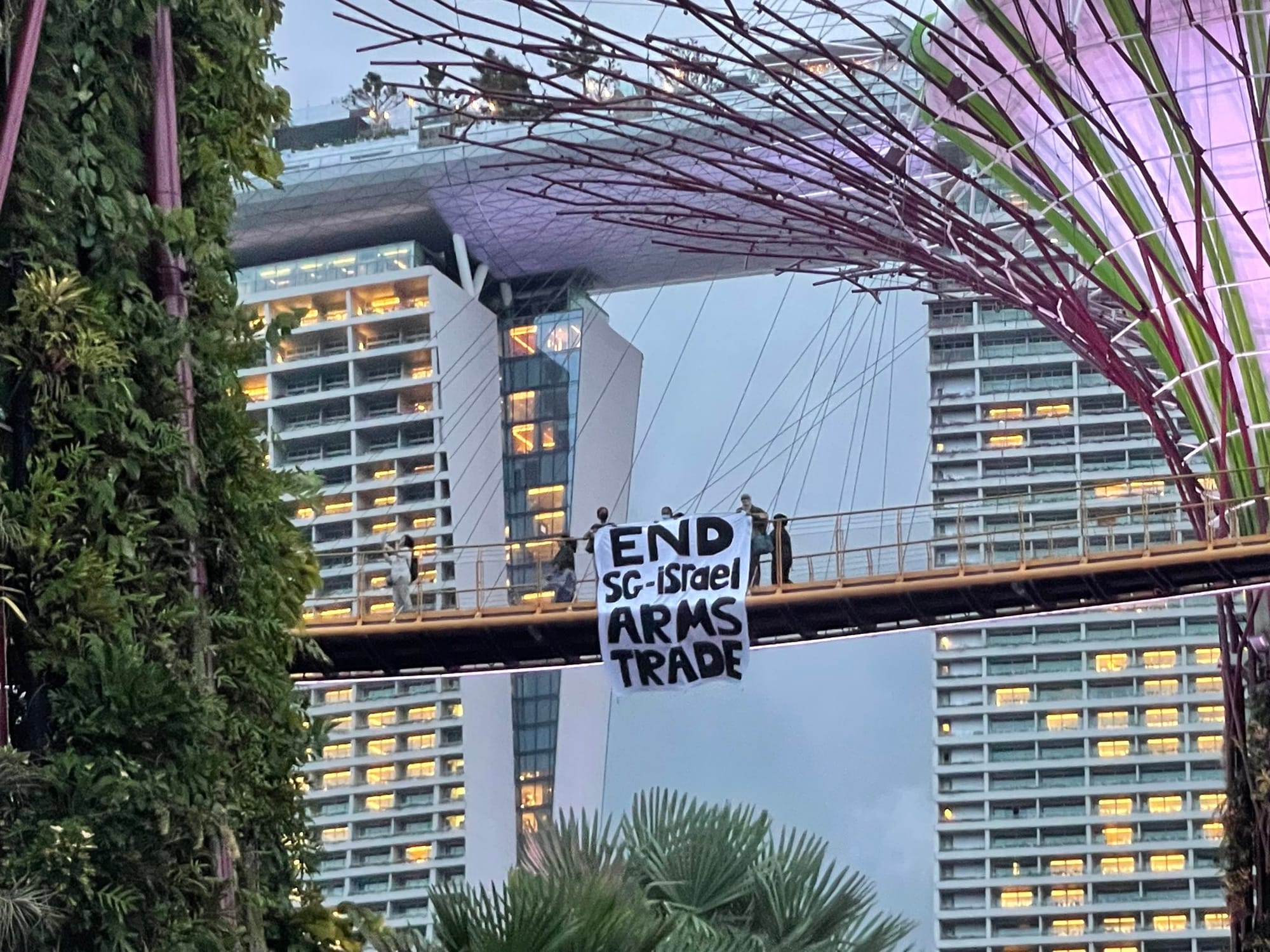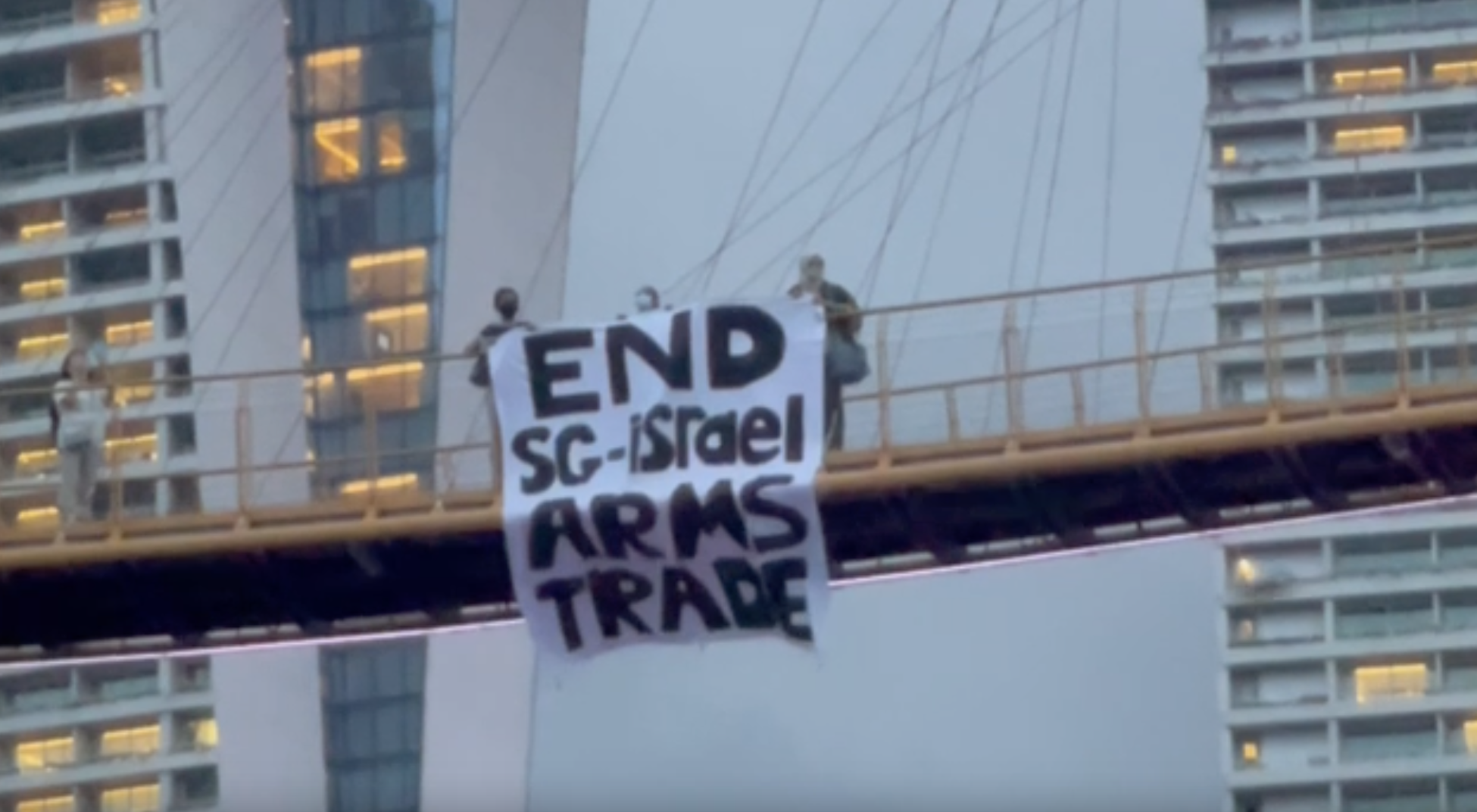Today's announcement is surely worth a special issue, so here I am!

As tired office workers logged out of their computers on Monday evening to begin the commute home, three Singaporeans stood on the OCBC Skyway at Gardens by the Bay and unfurled a huge banner reading: "END SG-ISRAEL ARMS TRADE". They only stayed for a few minutes, but it was already a big, brave action—the authorities have made it clear that, unless state-sanctioned, all public events related to Israel and Gaza are illegal.
"Over the past six months, we have witnessed the Israeli war machine indiscriminately killing over 33,000 Palestinians and injuring over 75,000 people," they wrote in a statement sent to the press. "It is unacceptable that Singaporeans’ hard-earned money is used to fund genocide, and that we continue to provide a platform for the perpetrators of such violence. One of the most important steps the Singapore government can take is to stop the arms trade with Israel."
Although Lee Hsien Loong is still the head of Singapore’s government, an announcement made hours earlier means that Lee’s response to this demonstration is now less relevant than that of another: Lawrence Wong, deputy prime minister and finance minister.
After lots of will-they-won’t-they-yes-they-will-well-then-when, Lee is finally stepping down as prime minister on 15 May—two years behind his original schedule of retiring at 70. Wong will be sworn in as Singapore’s fourth prime minister at 8pm on the same day. It sets him on track to deliver the National Day Rally in August and lead the People’s Action Party into a general election widely expected to be held this year. (If I were a betting person, I’d put money on September.)
“Every ounce of my energy shall be devoted to the service of our country and our people,” Wong pledged in a video posted on his Facebook page. “Your dreams will inspire my actions, your concerns will guide my decisions. I ask each of you to join me on this journey. Share your ideas, share your passions and dreams.”
In the days to come, there will be punditry and think-pieces galore. I suspect there will be much repetition: Wong’s civil service record, the credit he accumulated as a leader in the Covid-19 taskforce, his role in the Forward SG exercise, his guitar-playing to show his friendly, approachable side. I’ll be reading these pieces over the course of the week and you can expect to see some highlights in this weekend’s wrap. But, as usual, I’m most interested in aspects that might get dismissed as unimportant to the majority of voters because they aren’t “bread and butter issues”.
What will be politically or ideologically different about a Wong premiership? Regardless of what the PAP is willing to acknowledge, Singapore and Singaporeans are changing. There's a growing awareness that “bread and butter” isn’t just about CPF and property prices, important though those things might be, but also about human rights, labour protections and the climate crisis. It’s likely that there will be increasing pressure on issues—like racial justice, the death penalty and anti-capitalism—the PAP has long refused to cede ground on. How’s Wong going to handle all these things?
He's given us little to work with, because his answers and statements tend to be painfully cookie-cutter—it’s hard to figure out what the man’s actual political vision is. It’s allowed people to project all sorts of wishful thinking on to him, hoping for a more open and responsive form of governance, but there’s little clarity. When he appeals to Singaporeans to share ideas and passions, which ones will be listened to, and which ones will lead to hours-long questioning in a drab police station?
There will be no adjustment period or breathing room for Wong—there are too many things going on in the world for him to enjoy a premiership honeymoon. Today’s protest against Singapore's complicity in the genocide perpetrated by Israel (they've started a petition as well) is just the beginning of all the different causes, issues and movements the PAP will have to contend with. With Lee already in ORD mode, attention will now be on Wong’s response (or lack thereof).

I’ve not seen anything so far to make me optimistic that there’ll be significant change to the political environment Singapore civil society has to operate in. Which is to say that civil society will continue to be in for a hard time, even as increasing numbers of young Singaporeans are willing to take calculated risks for causes they feel strongly about. In a recent short review of the book We Are Not the Enemy: The Practice of Advocacy in Singapore, Ambassador-at-Large Tommy Koh wrote that he was “surprised by the number of angry young people in the book”. I think the real surprise for the establishment is that the young people were already moderating themselves in their book chapters. If the PAP and the elite circles around them—and I think Koh is already more open to activist and dissenting voices than most in that network—think Singaporeans are going to keep sitting down and shutting up, they’re setting themselves up for nasty shocks. It’s high time those in power consider that the restrictive environment they’ve created might end up prompting an escalation in tactics as people get increasingly frustrated and desperate. Case in point: today’s protest, staged after other forms of peaceful and legal advocacy hit dead ends.
The 4G does not enjoy the same level of adulation that previous generations of the PAP enjoyed. Wong is not stepping into an easy job. But since he’s willing to take on the challenge, there’s no need to give face either. He has a real opportunity to do something different. I don’t think he will. I hope he makes me eat my words.
Thank you for reading! Although special issues are usually only emailed to Milo Peng Funders, this one is free to all—feel free to forward it to anyone who might be interested!
